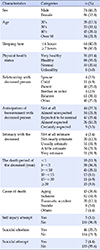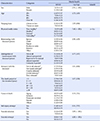Abstract
Purpose
The aim of this study was to identify factors influencing on the mental health in bereaved adults.
Methods
A descriptive and correlational study was conducted in 160 adults who had experienced bereavement. The collected data was analyzed using descriptive statistics, Pearson's correlation, and hierarchical multiple linear regression analyses with SPSS 26.0.
Results
The participants' mental health showed a positive correlation with complicated grief (r=.31, p<.001) and a negative correlation with grief and meaning reconstruction (r=−.30, p<.001). Sex, sleeping time, intimacy with the deceased, grief reaction, and grief and meaning reconstruction were significant factors influencing on the mental health. The total explanatory power of these variables was 31.8%.
Figures and Tables
References
1. Statistics Korea. Statistics of causes of death. Statistical information report for users [Internet]. 2018. cited 2018 Dec. Available from: https://meta.narastat.kr/metasvc/index.do?confmNo=101054&inputYear=2017.
2. Yang JS, Lyu JY. The development and effect of the grief therapy program for middle-aged women with bereavement. Korean Counseling. 2018; 19(3):293–312.

3. Nam IS. A feminine women's experience and living culture. Family and Culture. 2001; 13(2):79–106.
4. Shin JY, Lee DH, Seo EK, Jeon J. A qualitative study on the experience in the marital relationship of adolescent victims' parents: focusing on the experience of Sewol ferry disaster victims' families. Korean Journal of Psychology: General. 2018; 37(2):221–255. DOI: 10.22257/kjp.2018.06.37.2.221.

5. Choi M, Kim K, Kim D. Experiences of the elderly survivors after spouses' suicide-focusing on the rural areas. Mental Health and Social Work. 2016; 44(1):76–105.
6. Lee WH, Hwang AR. Grief stages and responses of bereaved mother who lost her children with cancer. Journal of Korean Academy of Nursing. 2003; 33(6):847–855. DOI: 10.4040/jkan.2003.33.6.847.

7. Min J, Choi H. Gender differences in the mediating effects of social participation on the association between widowhood and depressive symptoms: widowhood, social participation, and depressive symptoms. Journal of Korean Home Management Association. 2015; 33(4):67–82. DOI: 10.7466/JKHMA.2015.33.4.67.

8. Han H, Choi W, Huh S, Heo H, Chae JH. Understanding of complicated grief. Cognitive Behavior Therapy in Korea. 2016; 16(3):383–401.
9. Zhang B, El-Jawahri A, Prigerson HG. Update on bereavement research: evidence-based guidelines for the diagnosis and treatment of complicated bereavement. Journal of Palliative Medicine. 2006; 9(5):1188–1203. DOI: 10.1089/jpm.2006.9.1188.

10. Dutton YC, Zisook S. Adaptation to bereavement. Death Studies. 2005; 29(10):877–903. DOI: 10.1080/07481180500298826.

11. Meert KL, Shear K, Newth CJL, Harrison R, Berger J, Zimmerman J, et al. Follow-up study of complicated grief among parents eighteen months after a child's death in the pediatric intensive care unit. Journal of Palliative Medicine. 2011; 14(2):207–214. DOI: 10.1089/jpm.2010.0291.

12. Ahrens CE, Campbell R, Ternier-Thames NK, Wasco SM, Sefl T. Deciding whom to tell: expectations and outcomes of rape survivors' first disclosures. Psychology of Women Quarterly. 2007; 31(1):38–49. DOI: 10.1111/j.1471-6402.2007.00329.x.

13. Bolton EE, Glenn DM, Orsillo S, Roemer L, Litz BT. The relationship between self-disclosure and symptoms of posttraumatic stress disorder in peacekeepers deployed to Somalia. Journal of Traumatic Stress. 2003; 16(3):203–210. DOI: 10.1023/A:1023754820991.

14. Ullman SE. Psychometric characteristics of the social reactions questionnaire: a measure of reactions to sexual assault victims. Psychology of Women Quarterly. 2000; 24(3):257–271. DOI: 10.1111/j.1471-6402.2000.tb00208.x.

15. Davis RC, Brickman E, Baker T. Supportive and unsupportive responses of others to rape victims: effects on concurrent victim adjustment. American Journal of Community Psychology. 1991; 19(3):443–451.
16. Park CL, Ai AL. Meaning making and growth: new directions for research on survivors of trauma. Journal of Loss and Trauma. 2006; 11(5):389–407. DOI: 10.1080/15325020600685295.

17. Davis CG, Nolen-Hoeksema S, Larson J. Making sense of loss and benefiting from the experience: two constructions of meaning. Journal of Personality and Social Psychology. 1998; 75(2):561–574. DOI: 10.1037/0022-3514.75.2.561.

18. Hwang JY, Kim MO, Cheon SM. Development and validation of mourning scale for adults. Journal of Rehabilitation Psychology. 2014; 21(3):537–560.
19. Prigerson HO, Jacobs SC. Traumatic grief as a distinct disorder: a rationale, consensus criteria, and a preliminary empirical test. Washington DC: American Psychological Association;2001. p. 613–646.
20. Jo MS. The effect of meaning making and centrality of event on pathological grief symptoms of bereaved family [dissertation]. Seoul: The Catholic University of Korea;2012. 193 p.
21. Sim KS, Ahn HN. A validation of the Korean version of the Social Reactions Questionnaire. The Korean Journal of Counseling and Psychotherapy. 2014; 26(2):271–296.
22. Gillies JM. Meaning reconstruction in response to bereavement: constructing a measure [dissertation]. Tennessee: The University of Memphis;2005. 139 p.
23. Goldberg DP, Hiller VF. A scaled version of the General Health Questionnaire. Psychological Medicine. 1979; 9(1):139–145.

24. Park JI, Kim YJ, Cho MJ. Factor structure of the 12-item General Health Questionnaire in the Korean general adult population. Journal of Korean Neuropsychiatric Association. 2012; 51(4):178–184. DOI: 10.4306/jknpa.2012.51.4.178.

25. Park SJ. Relationship between mourning experience and posttraumatic growth: mediating effect of resilience and self-esteem. Korean Journal of Family Welfare. 2017; 22(4):565–583. DOI: 10.13049/kfwa.2017.22.4.2.

26. Youn MS, Kim NH, Choi HJ. The mediating role of meaning in life between the experiences of parental bereavement and posttraumatic growth among university students. Korean Journal of Family Social Work. 2013; 39:83–111.
27. Foynes MM, Freyd JJ. An exploratory study evaluating responses to the disclosure of stressful life experiences as they occurred in real time. Psychological Trauma: Theory, Research, Practice and Policy. 2013; 5(3):295–300. DOI: 10.1037/a0028408.

28. Neria Y, Gross R, Litz B, Maguen S, Insel B, Seirmarco G, et al. Prevalence and psychological correlates of complicated grief among bereaved adults 2.5-3.5 years after September 11th attacks. Journal of Traumatic Stress. 2007; 20(3):251–262. DOI: 10.1002/jts.20223.

29. Choi SJ, Ahn HN. The relationship between meaning reconstruction in response to loss experience and psychological adjustment. Korean Journal of Counseling. 2013; 14(1):323–341. DOI: 10.15703/kjc.14.1.201302.323.

30. Lee HG. A study on the relationship between grief level and suicidal ideation among the bereaved elderly who are living alone: focusing on the mediating effects of depression. Mental Health and Social Work. 2016; 44(1):24–47.




 PDF
PDF ePub
ePub Citation
Citation Print
Print







 XML Download
XML Download